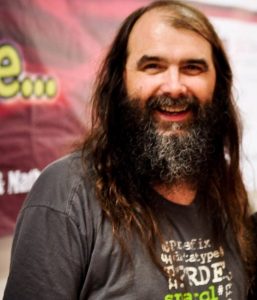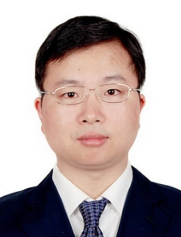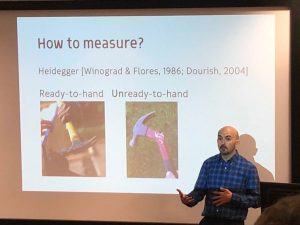
Abstract:
Bio:
Event details
- When: 18th February 2020 14:00 - 15:00
- Where: Cole 1.33b


Visual programming environments have long been applied in an educational context for encouraging uptake of computer science, with a more recent focus on blocks-based programming as a means to teach computational thinking concepts. Today, students in primary, secondary and even tertiary education are learning to code through blocks-based environments like Scratch and App Inventor, and studies in these settings have shown that they ease the transition to ‘real’ programming in high-level languages such as Java and Python. My question is, do we need to bother with that transition? Can we accomplish more with blocks than just programming for its own sake? More ‘serious’ visual programming environments like LabVIEW for engineers, and Blueprints embedded in the Unreal Engine for game developers are testament to visual programming producing more than just toy programs, so how far could blocks go? In this talk, I’ll give an overview of blocks-based programming and its applications outside education, including its role in my PhD project and current postdoctoral research in allowing end-users with no programming experience to tailor spoken dialog systems.
Daniel is a postdoctoral research fellow working in the HCI group in UCD on the B-SPOKE project with Dr Ben Cowan. The goal of this project is to open up the development of Spoken Dialog Systems to the end-user without programming experience, through techniques from the field of end-user development. Prior to this, Daniel completed his PhD at the University of St Andrews, focusing on the adoption of an end-user development tool for psychology researchers to create their own data collection apps. Daniel is especially interested in applying blocks-based programming (the visual approach to learning code used in well-known tools like Scratch) to domain-specific applications, allowing end-users to customise their software experiences without writing a single line of code.

Abstract: Innovation and creativity are the research drivers of the Human-Computer Interaction (HCI) community which is currently investing a vast amount of resources in the design and evaluation of “new” user interfaces and interaction techniques, leaving the correct functioning of these interfaces at the discretion of the helpless developers. In the area of formal methods and dependable systems the emphasis is usually put on the correct functioning of the system leaving its usability to secondary-level concerns (if at all addressed). However, designing interactive systems requires blending knowledge from these domains in order to provide operators with enjoyable, usable and dependable systems. The talk will present possible research directions and their benefits for combining several complementary approaches to engineer interactive critical systems. Due to their specificities, addressing this problem requires the definition of methods, notations, processes and tools to go from early informal requirements to deployed and maintained operational interactive systems. The presentation will highlight the benefits of (and the need for) an integrated framework for the iterative design of operators’ procedures and tasks, training material and the interactive system itself. The emphasis will be on interaction techniques specification and validation as their design is usually the main concern of HCI conferences. A specific focus will be on automation that is widely integrated in interactive systems both at interaction techniques level and at application level. Examples will be taken from interactive cockpits on large civil commercial aircrafts (such as the A380), satellite ground segment application and Air Traffic Control workstations.
Bio: Dr. Philippe Palanque is Professor in Computer Science at the University Toulouse 3 “Paul Sabatier” and is head of the Interactive Critical Systems group at the Institut de Recherche en Informatique de Toulouse (IRIT) in France. Since the late 80s he has been working on the development and application of formal description techniques for interactive system. He has worked for more than 10 years on research projects to improve interactive Ground Segment Systems at the Centre National d’Etudes Spatiales (CNES) and is also involved in the development of software architectures and user interface modeling for interactive cockpits in large civil aircraft (funded by Airbus). He was involved in the research network HALA! (Higher Automation Levels in Aviation) funded by SESAR programme which targets at building the future European air traffic management system. The main driver of Philippe’s research over the last 20 years has been to address in an even way Usability, Safety and Dependability in order to build trustable safety critical interactive systems. He is the secretary of the IFIP Working group 13.5 on Resilience, Reliability, Safety and Human Error in System Development, was steering committee chair of the CHI conference series at ACM SIGCHI and chair of the IFIP Technical Committee 13 on Human-Computer Interaction.

Title: Toward magnetic force based haptic rendering and friction based tactile rendering
Abstract: Among all senses, the haptic system provides a unique and bidirectional communication channel between humans and the real word around them. Extending the frontier of traditional visual rendering and auditory rendering, haptic rendering enables human operators to actively feel, touch and manipulate virtual (or remote) objects through force and tactile feedback, which further increases the quality of Human-Computer Interaction. It has been effectively used for a number of applications including surgical simulation and training, virtual prototyping, data visualization, nano-manipulation, education and other interactive applications. My work will explore the design and construction of our magnetic haptic interface for force feedback and our surface friction based tactile rendering system through combining electrovibration effect and squeeze film effect.
Bio: Dr XIONG LU is an Associate Professor in College of Control Engineering at Nanjing University of Aeronautics and Astronautics and is an academic visitor in St Andrews HCI research group in the School of Computer Science at University of St Andrews. He received his Ph.D. degree in Measuring and Testing Technologies and Instruments from Southeast University, in China. His mainly research interests is Human-Computer Interaction, Haptic Rendering and Tactile Rendering.

Speaker: Stephen Brewster (University of Glasgow)
Venue: The Byre Theatre
9:30: Lecture 1: The past: what is multimodal interaction?
10:30 Coffee break
11:15 Lecture 2: The present: does it work in practice?
12:15 Lunch (not provided)
14:15 The future: Where next for multimodal interaction?
Professor Brewster is a Professor of Human-Computer Interaction in the Department of Computing Science at the University of Glasgow, UK. His main research interest is in Multimodal Human-Computer Interaction, sound and haptics and gestures. He has done a lot of research into Earcons, a particular form of non-speech sounds.
He did his degree in Computer Science at the University of Herfordshire in the UK. After a period in industry he did his PhD in the Human-Computer Interaction Group at the University of York in the UK with Dr Alistair Edwards. The title of his thesis was “Providing a structured method for integrating non-speech audio into human-computer interfaces”. That is where he developed my interests in Earcons and non-speech sound.
After finishing his PhD he worked as a research fellow for the European Union as part of the European Research Consortium for Informatics and Mathematics (ERCIM). From September, 1994 – March, 1995 he worked at VTT Information Technology in Helsinki, Finland. He then worked at SINTEF DELAB in Trondheim, Norway.

Abstract: This talk will describe a range of our projects, utilising functional Near Infrared Spectroscopy (fNIRS) in HCI. As a portable alternative that’s more tolerate of motion artefacts than EEG, fNIRS measures the amount of oxygen in the brain, as e.g. mental workload creates demand. As opposed to BCI (trying to control systems with our brain), we focus on brain-based HCI, asking what brain data can tell us about our software, our work, our habits, and ourselves. In particular, we are driven by the idea that brain data can become personal data in the future.
Bio: Dr Max L. Wilson is an Associate Professor in the Mixed Reality Lab in Computer Science at the University of Nottingham. His research focus is on evaluating Mental Workload in HCI contexts – as real-world as possible – primarily using functional Near Infrared Spectroscopy (fNIRS). As a highly tolerant form of brain sensor, fNIRS is suitable for use in HCI research into user interface design, work tasks, and everyday experiences. This work emerged from his prior research into the design and evaluation of complex user interfaces for information interfaces. Across these two research areas, Max has over 120 publications, including a Honourable Mention CHI2019 paper on a Brain-Controlled Movie – The MOMENT.

Abstract: The 2D plane underpins most displays of information and therefore most of the ways in which interface designers and data analysts can dynamically represent information. As a user interface and information visualization designer/researcher I encounter the 2D plane often as a necessity and sometimes as an opportunity to enhance human cognitive processes.
Maps, who are the original example of use of the 2D plane to represent information serve often as inspiration.In this talk, I will discuss some of my most exciting encounters with the 2D plane and maps, and reflect on their deeper affordances to support thinking and understanding. I hope also to engage in conversation with you in the audience about what maps and the 2D plane mean for you and how you use them.